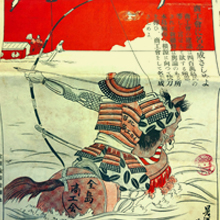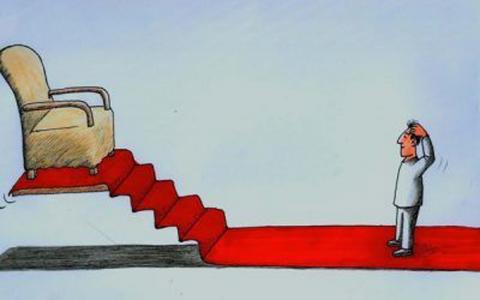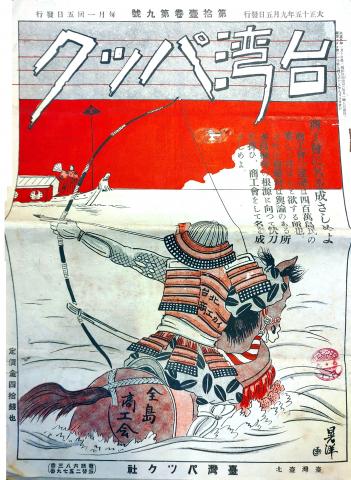
¿Habrá humor chino genuino o es más una contrafación? Ya en el siglo XVI/XVII, los comerciantes occidentales advertían a sus compañeros sobre el arte chino de la falsificación, incluso de sus propias creaciones. Actualmente les ofende el término falsificación, pues es más bien una «contrafación» y casi se podría decir lo mismo del cartoonismo importado de occidente, manteniendo su propio arte de humor gráfico. Respecto a lo que hace reír a los chinos, sólo ellos mismos lo saben, ya que su relación con el cómico es un poco extraña para el occidental. Sin embargo, ya cuentan con cientos de artistas trabajando al estilo occidental y participando en concursos internacionales (artistas de 7 a 77 años), en un intento de agradar a otras culturas y ganar los respectivos premios, evitando parecer chinos.
Como dictadura, hoy en día, no es fácil crear humor crítico en la República Popular China, optando por temas internacionales, universalistas, o de simple entretenimiento, muy diferente a cuando Lin Yutang impuso el «Youmo» chino, a principios de la siglo XX como elemento civilizador de su sociedad cuyo baluarte fue su revista «Las Analectas Quincenales» (el término ancestral con unos 2.000 años es «Huaji» que significa ingenio, ironía, sarcasmo).
Según Lin, «Youmo» era una virtud que faltaba en China, como elemento de diálogo sociopolítico, de superación de la apatía imperialista, liberando el espíritu republicano. Su época dorada fueron los años treinta con su irreverencia hacia las convenciones y la autoridad. Hubo entonces muchos debates sobre cómo y de qué reírse, sobre si los chinos podían reír o simplemente sonreír... Uno de los caballos de batalla de Lin Yutang es que la dinastía Song había adulterado el pensamiento de Confucio, quitándole su visión humorística de la vida, imponiendo sólo la parte puritana del comportamiento.
Pero no sólo Confucio vive lo chino y su pensamiento resultó ser un choque constante de directivas confucianas, taoístas y budistas (en las que estas dos últimas se muestran más abiertas a las virtudes de lo cómico) configurando su postura para sonrisas sutiles, íntimas, a veces filosófico o nihilista. Por ejemplo, el humor físico no está bien visto, porque hay miedo al ridículo personal y de los demás, por lo que tampoco les gusta cuando el tema es algo personal, íntimo. Usan mucho los llamados «chistes fríos», es decir, son chistes cómicos solo porque no tienen nada de gracioso, absurdo. El sarcasmo, en cambio, resultó ser más la línea de su comicidad, principalmente en ciertos sectores sociales, una forma más intervencionista en la que el juego de palabras (lingüística, sonoridad, entonación) es la raíz de esa comicidad.
O culto do «Mianzi» (Salvar las apariencias) es importante como equilibrio social, por eso evitan reírse de tópicos delicados como la política, critica aos costumes e cultura (num país com centenas de povos bem diferenciados) y sobre todo en publico. Según el confucianismo, uno debe abstenerse de reírse y sólo hacerlo en determinados círculos de amigos, complicidades porque mantener la dignidad y el honor personal es fundamental (el miedo al ridículo es muy oriental). La mujer debe llevarse la mano a la boca cuando se ríe o sonríe. Una persona seria es más digna que una persona humorística, porque lo cómico debe ser explorado fundamentalmente por profesionales del espectáculo.
La moderación es pues la base de su actitud que, con la apertura a occidente, con la explosión de las redes sociales está siendo cuestionada, comprobándose la occidentalización conductual de la juventud, deseosa de la libertad de reír y disfrutar de la vida con toda la irreverencia de costumbres falsificadas, para bien o para mal.
Finalmente, doy la palabra al dibujante Jia Ruijun, el único, entre los veinte artistas invitados a colaborar, que respondió. ¿Por dificultades con el idioma, por no querer enfrentarse a palabras que podrían ser mal interpretadas por las autoridades? Según Jia: «No es fácil hacer humor en China, pero no hay tabúes. Cualquier arte visual es un proyecto cooperativo entre los creadores y el público, y la cooperación requiere cooperación en todos los aspectos. A medida que el mercado madure, a medida que haya más solicitudes de estas obras, el mercado de cartoons mejorará cada vez más en el futuro y no habrá reversión Cualquier creación depende de si el mercado lo necesita. El cartoon es mi hobby, porque no puedo depender de él para vivir».

Jia Ruijun

Humor Chines.
Humors of the World - China
By Osvaldo Macedo de Sousa
Will there be genuine Chinese humor or is it more of a counterfeit? Already in the 16th/17th century, Western merchants warned their companions about the Chinese art of falsification, even their own creations. Currently they are offended by the term forgery, as it is more of a «counterfeit» and the same could almost be said of cartoonism imported from the West, maintaining their own art of graphic humor. Regarding what makes the Chinese laugh, only they themselves know, since their relationship with the comic is a little strange for the Westerner. However, they already have hundreds of artists working in the western style and participating in international competitions (artists from 7 to 77 years old), in an attempt to please other cultures and win the respective prizes, avoiding appearing Chinese.
As the dictatorship that it is, nowadays, it is not easy to create critical humor in the People s Republic of China, opting for international, universalist themes, or simple entertainment, very different from when Lin Yutang imposed the Chinese «Youmo», at the beginning of the century XX as a civilizing element of its society whose bulwark was its magazine «The Analects Fortnightly» (the ancestral term with about 2,000 years is «Huaji» which means wit, irony, sarcasm).
According to Lin, «Youmo» was a virtue that was lacking in China, as an element of sociopolitical dialogue, of overcoming imperialist apathy, freeing the republican spirit. Its golden period was the thirties with its irreverence towards conventions and authority. There were then many debates about how and at what one should laugh, about whether the Chinese could laugh or just smile... One of Lin Yutang s battle horses is that the Song dynasty had adulterated Confucius thinking, removing his humorous vision. of life, imposing only the puritanical part of behavior.
But not only Confucius lives the Chinese and his thought turned out to be a constant clash of Confucian, Taoist and Buddhist directives (in which the latter two are more open to the virtues of the comic) shaping his posture for subtle, intimate smiles, sometimes philosophical or nihilistic. For example, physical humor is not well regarded, because there is a fear of personal ridicule and that of others, which is why they also do not like it when the topic is something personal, intimate. They use the so-called «cold jokes» a lot, that is, they are comic jokes just because there is nothing funny about them – absurd. Sarcasm, on the other hand, turned out to be more the line of his comicity, mainly in certain social sectors, a more interventionist form in which the play on words (linguistics, sounds, intonation) is the root of that comicity.
The cult of «Mianzi» (saving face) is important as a social balance, which is why they avoid laughing at sensitive topics such as politics, criticism of customs and culture (in a country with hundreds of well-differentiated peoples) and above all in public. According to Confucianism, one should refrain from laughing and only do so in certain circles of friends, complicities because maintaining one's dignity and personal honor is fundamental (the fear of ridicule is very oriental). The woman should put her hand in front of her mouth when she laughs or smiles. A serious person is more dignified than a person with a good sense of humor, because the comic must be fundamentally explored by entertainment professionals.
Moderation is therefore the basis of their attitude which, with the openness to the West, with the explosion of social networks, is being called into question, verifying the behavioral westernization of youth, desirous of the freedom to laugh and enjoy life with all the irreverence of counterfeit customs, for better or for worse.
Finally, I give the floor to the cartoonist Jia Ruijun, the only one, among the twenty artists invited to collaborate, who responded. For language difficulties, for not wanting to face words that could be misinterpreted by the authorities? According to Jia: «It s not easy to make humor in China, but there are no taboos. Any visual art is a cooperative project between creators and the public, and cooperation requires cooperation in all Aspects. As the market matures, as there are more requests for these works, the cartoon market will get better and better in the future and there will be no reversal. Any creation depends on whether the market needs it. Cartoonism is my hobby, because I can t just depend on it to live».
